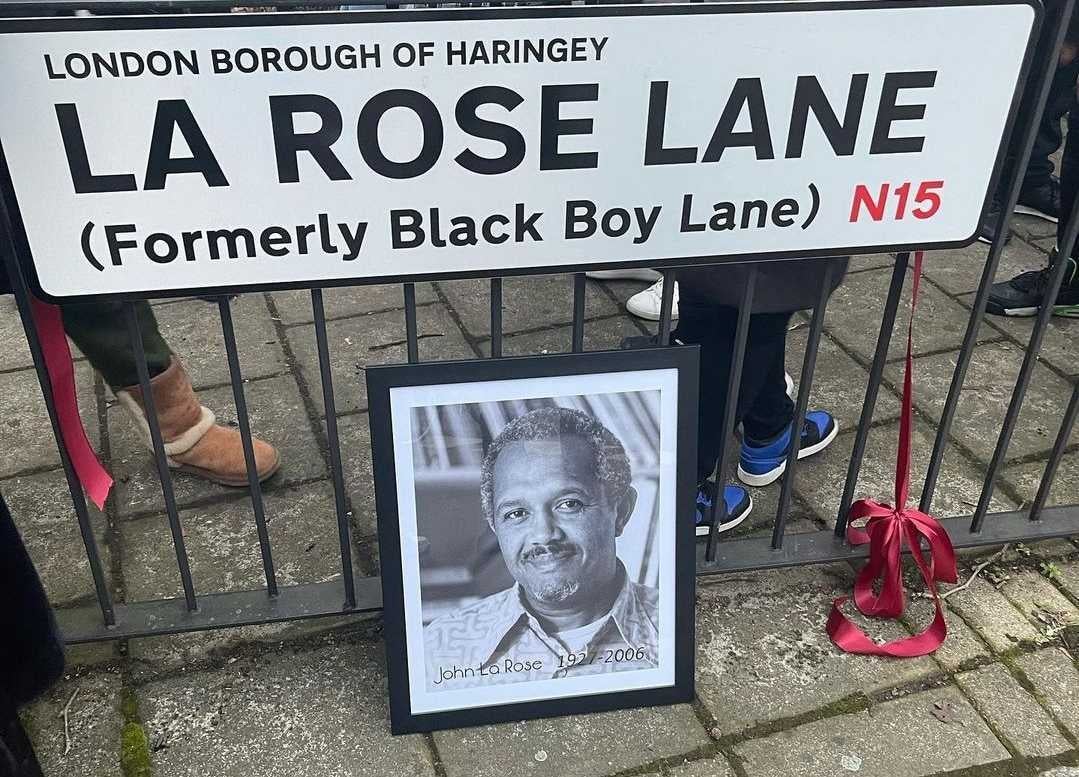London’s ‘Black Boy Lane’ renamed after fallout from Black Lives Matters protests
Black Boy Lane in Tottenham, was renamed La Rose Lane after John La Rose

Your support helps us to tell the story
From reproductive rights to climate change to Big Tech, The Independent is on the ground when the story is developing. Whether it's investigating the financials of Elon Musk's pro-Trump PAC or producing our latest documentary, 'The A Word', which shines a light on the American women fighting for reproductive rights, we know how important it is to parse out the facts from the messaging.
At such a critical moment in US history, we need reporters on the ground. Your donation allows us to keep sending journalists to speak to both sides of the story.
The Independent is trusted by Americans across the entire political spectrum. And unlike many other quality news outlets, we choose not to lock Americans out of our reporting and analysis with paywalls. We believe quality journalism should be available to everyone, paid for by those who can afford it.
Your support makes all the difference.London’s ‘Black Boy Lane’ was renamed after a renowned Black publisher following concerns about its racial connotations.
The street, in Tottenham, will now be called La Rose Lane after John La Rose.
Haringey Council started a consultation into the planned name change following the murder of George Floyd in Minneapolis in May 2020 and subsequent Black Lives Matter protests. It is understood that Black Boy Lane was named after a pub in the late 17th century.
The local authority said the name change was prompted after many residents shared concerns about the racial connotations of the name and the impact its continued use has on Black people in Haringey.
Councillor Peray Ahmet, Leader of Haringey Council, said she was “delighted to honour Mr La Rose with the street name. “John made such a huge contribution to Black life both here in Haringey and across the UK and played an important role in gaining recognition for Black authors and artists, as well as championing inclusive education,” she said.
Mr La Rose, a Haringay local, was a political activist and launched New Beacon Books in 1966 - the first specialist Caribbean publishing company in Britain. He was also chairman of the George Padmore Institute.
The institute, which is an archive, library, educational resource and research centre that houses “materials relating to the Black community of Caribbean, African and Asian descent in Britain and continental Europe”, was established in 1991 by La Rose and fellow activists including Sarah White and Professor Gus John.
Renaldo La Rose, the grandson of John La Rose, said:“John’s family are really proud that John’s life and work is to be recognised by having a road named after him. John’s work was of national and international significance but much of it started here in Haringey.
“We hope that through having his name memorialised in this way we will bring the message of his work – the urgent need for race equality and justice – to a new audience.”
Professor Gus John welcomed the renaming of the street after Mr La Rose, his long-time friend and colleague.
Speaking to The Independent, the academic said: “John La Rose did more to help Britain confront the legacy of empire and the racism it spawned than arguably any other publisher and bookseller since the end of empire.
“He was pivotal to the development of the Black Supplementary School Movement, the Caribbean Artists Movement and the Black Parents Movement, as well as campaigns against Haringey’s own schooling practices and policies which were systemically racist impacting, in the most damaging way, the life chances of Caribbean children in particular.
Professor John, who’s a director at New Beacon bookshop, added: “A road whose name had its origin in the trade in enslaved Africans has at last caught up with history and is reflecting the historic efforts of the father of the Black resistance movement and the most iconic figure in the movement for racial equity and social justice in Britain.”
The renaming of streets and removal of colonialists monuments came after a number of petitions emerged online amid the Black Lives Matter protests demanding that relics of the UK’s imperialist past were taken down.
A statue of slave trader Edward Colston, a 17th-century merchant whose Royal African Company transported slaves to the West Indies and America, was pulled down during a Black Lives Matter protest in Bristol on 7 June 2020 before being rolled into the harbour.
In October 2021, the Mayor of London Sadiq Khan offered £25,000 in grants to change street names in London and "celebrate the histories and experiences of Londoners from diverse backgrounds".
The funding forms part of the mayor’s £1 million Untold Stories fund set up to champion diversity and improve representation in the capital’s public spaces.
Ealing council already moved to change the name of Havelock Road named after colonialist commander Sir Henry Havelock. It was officially renamed ‘Guru Nanak Road’ last January.
Cecil Rhodes House in Camden, named after the British colonialist, was renamed Park View House and Cassland Road Gardens in Hackney, after merchant Sir John Cass, will also be renamed.
Meanwhile, thousands of people have signed petitions calling for the statue of British colonialist Cecil Rhodes to be taken down from Oriel College at the University of Oxford which still remains in place.





Join our commenting forum
Join thought-provoking conversations, follow other Independent readers and see their replies
Comments